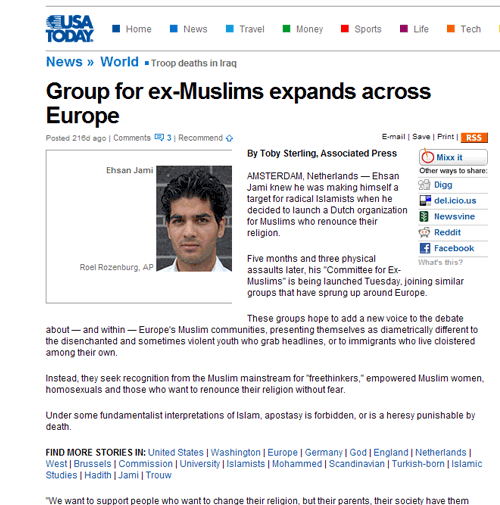Group for ex-Muslims expands across Europe, USA Today
By Toby Sterling, Associated Press AMSTERDAM, Netherlands — Ehsan Jami knew he was making himself a target for radical Islamists when he decided to launch a Dutch organization for Muslims who renounce their religion.
Five months and three physical assaults later, his “Committee for Ex-Muslims” is being launched Tuesday, joining similar groups that have sprung up around Europe.
These groups hope to add a new voice to the debate about — and within — Europe’s Muslim communities, presenting themselves as diametrically different to the disenchanted and sometimes violent youth who grab headlines, or to immigrants who live cloistered among their own.
Instead, they seek recognition from the Muslim mainstream for “freethinkers,” empowered Muslim women, homosexuals and those who want to renounce their religion without fear.
Under some fundamentalist interpretations of Islam, apostasy is forbidden, or is a heresy punishable by death.
“We want to support people who want to change their religion, but their parents, their society have them clasped in it and won’t let them out,” Jami, 22, said in an interview with The Associated Press on Monday. “They would realize that they are not standing alone.”
The latest attack on Jami last month, when he was struck and pushed to the ground at a shopping center by three youths, was widely publicized in the Netherlands. The assailants were arrested, but Jami was forced into hiding, and receives police protection.
He said an earlier attack was even more dangerous, when he was surrounded by a large group of youths at night and had a knife held to his throat.
He had anticipated death threats, he said, but had not fully appreciated what they meant.
“It’s like the death of family,” Jami said. “You know it will come, but you don’t know how much pain it will bring.”
Leaders of ex-Muslim groups from Germany and England plan to attend Tuesday’s launch, before meeting the European Commission in Brussels on Wednesday.
“Very clearly our intent is to break the taboo” within Islam against renouncing religion, said Maryam Namazie, who in June founded The British Council of Ex-Muslims.
“The first step is making it easier to do that. You could compare it to when the first gays came out of the closet,” she said.
Other groups have formed in the Scandinavian countries. Altogether, the European groups have total membership of no more than several hundred.
But the ex-Muslims say they are determined to show that “not all people from Muslim countries are religious,” said Arzu Toker, vice president of Germany’s Council of Ex Muslims, the first and largest of the organizations.
“If we don’t show it, many people (in the West) will think ‘all these people are just the same,’ and that’s simply not true,” she said.
Toker, a Turkish-born journalist, says membership in Germany has grown to more than 100 from 18 founders in January. Hundreds more have written to show their support, but are unwilling, unable or afraid to join.
Akbar Ahmed, who chairs the Islamic Studies department at American University in Washington, said the advent of such groups is not surprising.
“Expatriates may be intellectually questioning, given the freedom they have from being abroad,” he said. “A few may decide they are fed up with Islam — others become much more vigorously Islamic.”
He gave the example of Muslim girls living in the West who wear veils, but never would have done so in the country they immigrated from.
He said it is wrong to say Islam endorses killing apostates, though some of the Hadith, or sayings attributed to Mohammed, appear to endorse it — when taken out of context, he said.
Salima Belhaj, who is not a member of Jami’s group, says she has been branded as an apostate because of her modern lifestyle.
“It’s others who decide that I’m an ex-Muslim, because I wear short skirts or don’t go the mosque and drink a glass of wine” now and then, she told the newspaper Trouw.
She said she still considers herself a Muslim, “but I don’t think that others should decide how I live my life. As I see it, Islam is something between you and God.”
Ayaan Hirsi Ali, a Somali-born Dutch lawmaker who abandoned Islam and lived under threat for years for her provocative criticism of fundamentalism, said she was “shocked” by the attack on Jami.
“The rule of law, the basis of a state with civil liberties, is hollow if it becomes dangerous to do your shopping,” Hirsi Ali said in a statement from the United States, where she took up residence last year after quitting the parliament.

